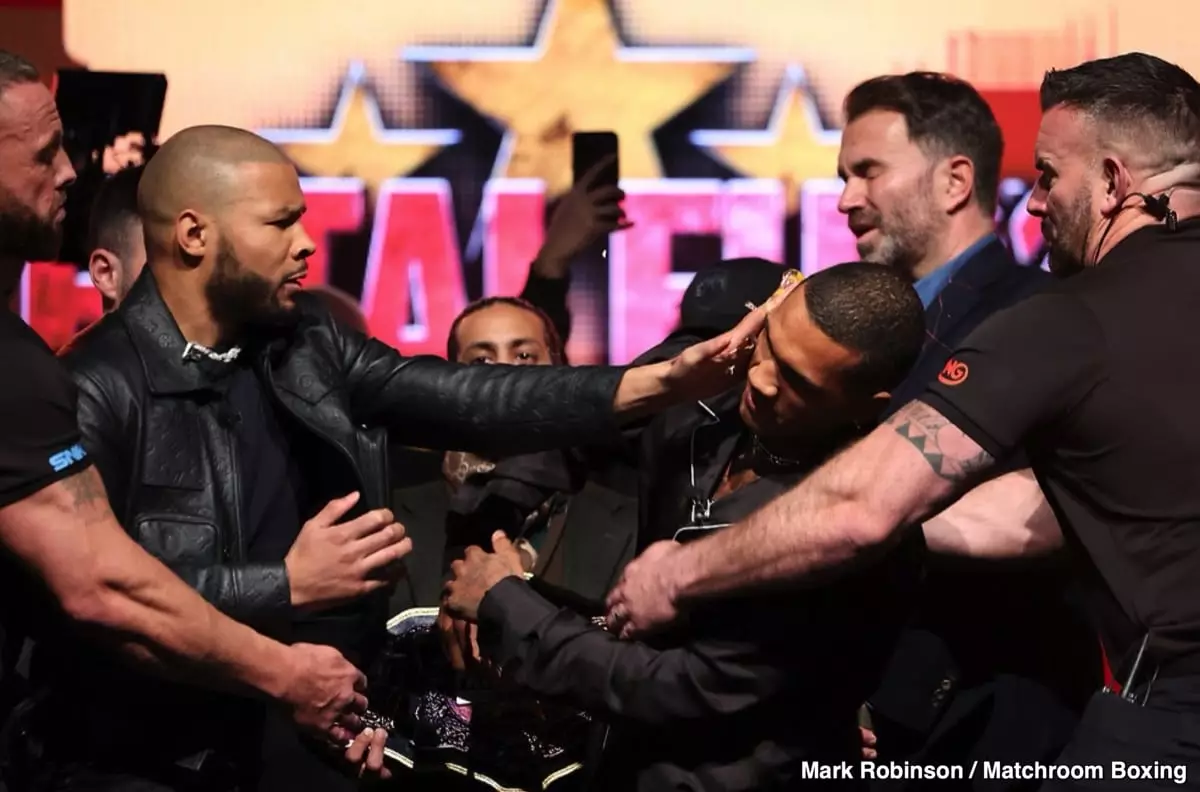The world of professional boxing is undeniably dramatic, often heightened by feuds, rivalries, and promotional theatrics. The recent incident involving Chris Eubank Jr. and Eddie Hearn during a press conference for their upcoming fight against Conor Benn exemplifies how tensions can escalate unexpectedly. In a brief but impactful moment, Hearn’s physical confrontation with Eubank Jr.’s promoter, Ben Shalom, raised eyebrows and sparked a whirlwind of commentary regarding professionalism and decorum in fight promotion.
This incident unfolded at the Manchester Central, where tensions were already palpable as anticipation builds for the fight set to take place at Tottenham Hotspur Stadium on April 26. Hearn, who has aggressively promoted boxing events and nurtured up-and-coming fighters, seemingly allowed the emotion of the moment to get the better of him. It raises an essential question: how far can promoters go in their role to stoke excitement without crossing the line into unprofessional behavior?
The shove that Hearn delivered to Shalom appeared to stem from a misinterpretation of the situation. Shalom suggested that Hearn may have believed the playful egging incident, initiated by Eubank Jr. against Benn, involved something far more serious. This points to a significant theme in boxing promotion—miscommunication can lead to explosive situations that might overshadow the actual sporting event. Instead of discussing strategic preparations or fight dynamics, the narrative shifts to physical altercations and personal conflicts.
In Shalom’s words, “Eddie thinks he’s a fighter,” there lies an underlying critique of how personalities in the sport sometimes lose sight of their actual roles. Promoters are supposed to facilitate the build-up to the fight, ensuring athletes can safely market themselves. Yet, when a promoter behaves like a fighter, it raises questions about their understanding of boundaries and professionalism.
Promotions are certainly an integral part of boxing; the excitement around fights hinges on the narratives spun by promoters, athletes, and their camps. However, this balancing act frequently sees the line between genuine conflict and carefully crafted hype blur. Hearn expressed concerns about the potential for physical confrontations to threaten the actual fight, which is a genuine worry—if fighters are kept too close to their adversaries, emotions can run high outside of planned engagements.
Moreover, Shalom’s insistence that “we’re not gangsters” goes beyond mere frustration; it suggests a craving for civility in a sport that is increasingly being consumed by its drama. The inability to manage conflicting tensions without resorting to physicality threatens to undermine the legitimacy of the sport itself. Will spectators come for the fight or the drama? The lines often become hazy.
Shalom’s analysis of the incident speaks volumes about the future implications for boxing promotions. He indicated a necessity for preemptive measures to keep fighters separated ahead of the bout. This approach, while aiming to preserve the fights from cancellation due to disruptions, may detract from what fans have largely come to appreciate: the visceral anticipation that exists between fighters.
While security measures are undoubtedly vital, promoters must also cultivate an environment that allows for strategic interactions, press opportunities, and face-offs. These dynamics are part of the narrative thread that ultimately draws audiences to the arena. The question remains: how can promotions remain captivating without veering into chaos?
The incident between Hearn and Shalom serves as a reflective moment for boxing promotion as a whole. It invites stakeholders—promoters, fighters, and fans alike—to consider the balance between entertainment and professionalism. As the fight with Benn approaches, the focus for promoters should be not only on selling the event but maintaining the sport’s dignity and respectability. For boxing to thrive and sustain its audience’s interest, it must prioritize the beauty of the fight above the tantalizing allure of drama that can so easily spiral out of control. The challenge is formidable, but the sport deserves a commitment to integrity and mutual respect above all else.


Leave a Reply